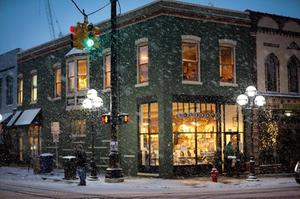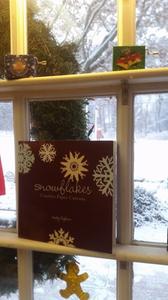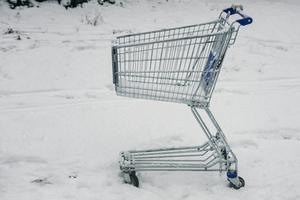As a rule a bookshop is horribly cold in winter, because if it is too warm the windows get misted over, and a bookseller lives on his windows.
--George Orwell, "Bookshop Memories" (1936)

|
|
| Literati Bookstore, Ann Arbor, Mich.: "There’s nothing cozier than a bookstore during a snow storm all aglow." | |
Forecasts for the book industry have always been cloudy, with at least a 50% chance of contradiction. For independent booksellers, however, gauging the weather is more than just a retail metaphor; it's a tangible factor in their day-to-day business decisions.
Weather can be the Grinch this time of year anywhere, if for different reasons. What is good weather for bookselling? That varies from region to region, of course. Often, however, the best bookstore weather is just a little bad, to lure people indoors, but not so bad they can't drive to your store at all. It's a fine line that gets razor thin during the holiday season.
My thoughts turned to bookselling weather last Saturday, when I spotted a great "Snow Safety Advisory" tweeted out by Belmont Books, Belmont, Mass.: "To increase car's traction in snow, purchase 20-50 lbs. of books from local #IndieBookstore and put them in trunk. Also doubles as emergency reading supply if power goes out. #YoureWelcome."
Then Changing Hands posted the following on Facebook Wednesday: "77 degrees and sunny in Phoenix. Still, a winter wonderland." It was 16 degrees outside my office, with single digit wind chill, when I read that one, but I appreciated the sentiment nonetheless.
Throughout December's all-important gift-shopping season, booksellers must chart weather forecasts with an alchemic blend of meteorology and wishful thinking. The window of opportunity can be slammed shut harshly by an ill-timed storm front, especially as the countdown to Christmas Day accelerates.

|
|
| Titcomb's Bookshop, East Sandwich, Mass.: "The view from here, a winter wonderland!" | |
Civilians--aka customers--may not realize how important the weather is to bookstores. They might assume that since bookselling is an indoor job, what's happening outside--short of a blizzard--can't possibly make or break a store's year. But it does matter, big time, to the Scrooge-ish bottom line, which doesn't give a tinker's damn whether the sun was shining in 2016 on this date, when sales were up 11% over the previous year day-to-day.
Weather excuses? Bah! Humbug!
Seeking the middle ground between "I'm dreaming of a white Christmas" and "the weather outside is frightful," most indie booksellers have been charting storm patterns online since Thanksgiving, and now hope predictions for Christmas week are not frightful, and that any lurking predatory storms will run out of time or strength before they can seriously threaten the rest of this crucial home stretch.
Please, Santa, all we want for Christmas is the absence of blizzards, Nor'easters or "freezing rain events" (as the Weather Channel people like to describe such things). No early afternoon closings. No snow days.
"As the largest external driver of consumer need, weather is more than just a conversation-starter for retailers," the National Retailer Federation noted this week. Evan Gold, executive v-p of global services at Planalytics, a company that helps retailers account for weather, said the trick is to remove weather-driven volatility from historical data to arrive at the 'weather-neutral baseline' from which retailers can plan, allocate resources and buy product in advance of the next season." Nice trick if you can pull it off, Evan.

"The secret around weather is that it very rarely repeats," he observed, adding that a common misconception among retailers is that year-over-year, they expect consumer demand to repeat previous patterns, but they overlook weather, particularly consumer's reactions to a chill in the air... or more. "50 degrees in Miami is very different than the same 50 degrees in Minneapolis."
Planalytics has identified "five myths about the weather's impact on retail":
- You can't plan for the weather.
- It all evens out in the end.
- Consumers will shop during the holidays, regardless of the weather.
- My products aren't seasonal, so the weather doesn't affect me.
- I'm an online retailer--the weather doesn't impact me.
My favorite may be this tidbit from myth #3: "During the holidays, weather not only influences if a customer goes into a store, it also influences the items they place in their basket. For example, 18% of boot sales are influenced solely by the weather in December...." Maybe boots could be an unexpected sidelines hit for bookstores next year. Or a holiday season cross-promotion with a shoe store? Does AccuWeather have a brainstorming forecast module?

On December 16, 2005, during my last week as a full-time bookseller, I began the day with a blog post at Fresh Eyes: A Bookseller's Journal: "Weather affects any business, but Vermont weather is a particularly nasty ingredient for a bookstore this time of year. Everything, or nearly everything, is riding on what happens between Black Friday and New Year's Day. One bad Friday or Saturday can be crippling financially in a way it wouldn't be in, say, mid-February. But Mother Nature doesn't give a sh*t, and this morning I woke up to sleet, freezing rain, snow, and, for extra spice, no heat in my house. So, the house was warming up some as I left it to drive the treacherous dozen miles to the bookstore. Now I'm at work and I don't expect to see many customers until after noon, assuming the roads clear and we don't get much more of what the weatherman cheerily calls 'wintry mix.' "
Later that night, I added: "The 'wintry mix' didn't deliver a knockout punch today (we opened and stayed open), but it certainly delivered a few good, stiff jabs to the chin. Tomorrow. we'll try again." Because that's what booksellers do, weather be damned.

